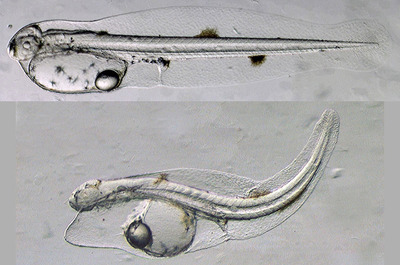Crude oil linked to heart defects in fish
Embryonic fish exposed to oil-contaminated water taken from the 2010 Deepwater Horizon spill developed defective hearts, according to a collaborative study that included researchers from the University of the Sunshine Coast.

In 2010, the Deepwater Horizon offshore oil-drilling rig spilled more than 636 million litres of crude oil into the northern Gulf of Mexico.
Some of this oil reached the open water of the northern Gulf of Mexico, potentially exposing developing embryos and larvae of large predatory fish, such as tunas and swordfish, to toxic polycyclic aromatic hydrocarbons - the upper surface water is the spawning habitat for these important pelagic fish species.
Following the previous major oil spill in the US (the 1989 Exxon Valdez spill in Alaska), crude oil was shown to disrupt excitation-contraction coupling in muscle cells isolated from the hearts of bluefin and yellowfin tuna embryos.
In this study, the researchers extended these findings to whole embryos of bluefin tuna, yellowfin tuna and amberjack by exposing them to field-collected Deepwater Horizon oil samples at environmentally relevant concentrations.
Each species developed consistent dose-dependent cardiac defects, including an irregular heartbeat, circulatory disruption and a build-up of fluid around the heart. The morphological and physiological defects occurred at lower concentrations of polycyclic aromatic hydrocarbons than those in many surface water samples collected from the Gulf of Mexico during the spill.
Cardiac function is particularly important for fast-swimming pelagic predators like tunas with a high aerobic demand. Because each species displayed an irregular atrial arrhythmia following oil exposure, the researchers suggest that fishes have a highly conserved response to oil toxicity.
The researchers also note that the same toxicity is probably happening in the wild, indicating there is likely to be widespread loss of pelagic fish larvae due to cardiac defects as a consequence of the Deepwater Horizon incident.
The research was published in Proceedings of the National Academy of Science USA.
Damaged RNA, not DNA, revealed as main cause of acute sunburn
Sunburn has traditionally been attributed to UV-induced DNA damage, but it turns out that this is...
Multi-ethnic studies identify new genes for depression
Two international studies have revealed hundreds of previously unknown genetic links to...
Oxygen deprivation may contribute to male infertility
Medical conditions that deprive the testes of oxygen, such as sleep apnoea, may be contributing...



